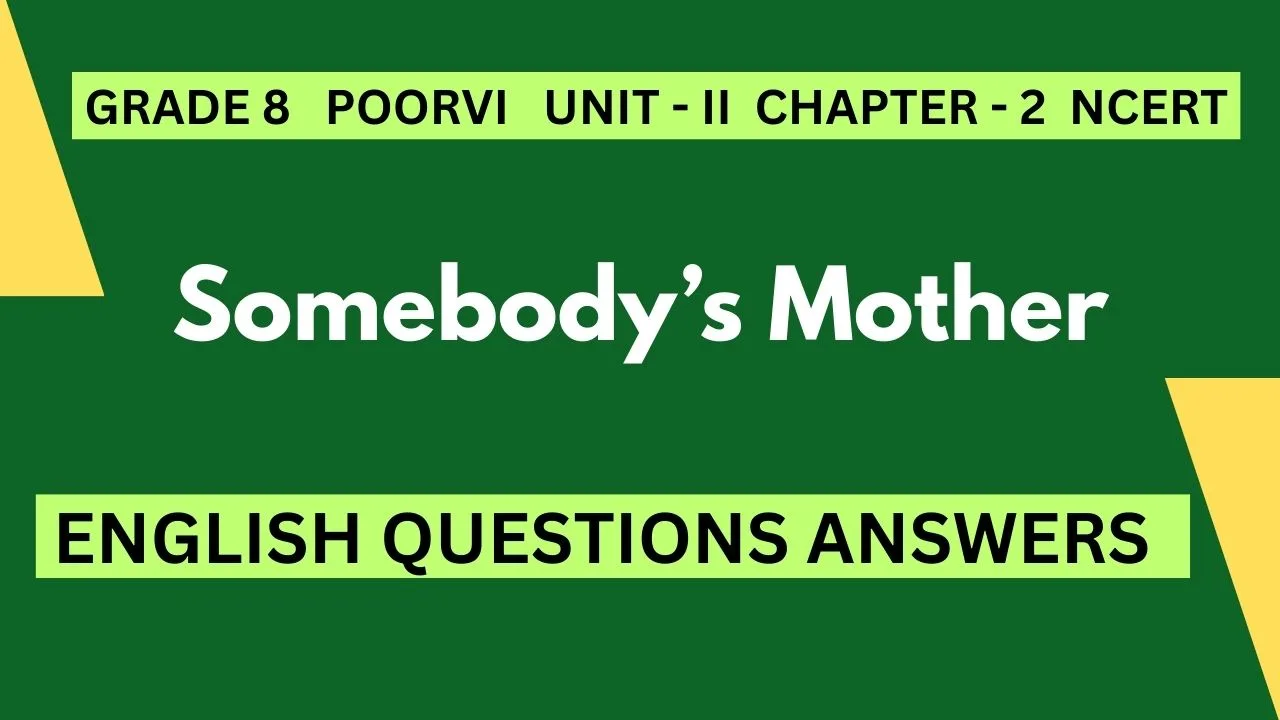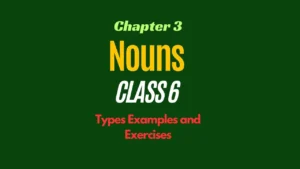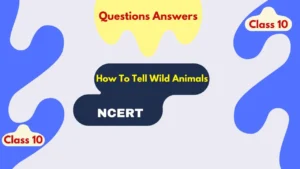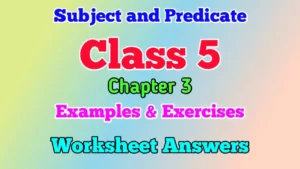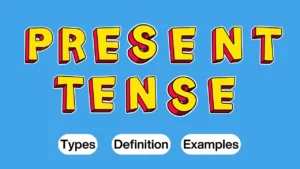Somebody’s Mother Questions Answers English NCERT Class 8 is a complete guide covering Unit II from the POORVI English textbook (2025–2026 new syllabus). This resource provides NCERT-based textual answers, stanza-wise summaries, important word meanings, and additional exam-focused questions for deeper understanding. Specially designed for Class 8 CBSE students, it strictly follows the latest NCERT curriculum and exam pattern, ensuring thorough preparation for classroom learning, homework, and examinations.
Somebody’s Mother NCERT Questions Answers
Somebody’s Mother NCERT Questions Answers for Class 8 with detailed solutions, word meanings, and summaries. Based on the 2025–26 Poorvi English syllabus. Includes extra exam-focused questions for complete preparation.
Let us do these activities before we read. (Page 70)
I Recall a time you helped someone.
Write two words describing:
1. What were your feelings after you did so?
Ans: happy, proud
POORVI: Textbook of English for Grade 8 NCERT Solution 2025-2026:
2. What might have been the feelings of the person whom you helped?
Ans: relieved, thankful
Share your answers with your classmates and teacher.
II Work in pairs. Read the words given below. Circle the words you would associate with an elderly person and underline the words you would associate with a school student. Share the reasons for your choices with your classmates and teacher. strong worried trembling hastening firm bent merry grey slow guide helpful
Ans:
Circle (elderly person): worried, trembling, bent, grey, slow, guide, helpful
Underline (school student): strong, hastening, firm, merry
Reasoning:
- Elderly people are often described as grey (hair), bent (posture), trembling (due to weakness), slow in movement, sometimes worried, and they may also be helpful or act as a guide to younger people.
- School students are usually strong, hastening (moving quickly), firm (energetic and confident), and merry (cheerful).
III Read the lines.
The woman was old and ragged and grey
And bent with the chill of the Winter’s day.
Select the suitable meaning of ‘ragged’ as used in these lines. There are other four meanings given below. Discuss with your classmates and teacher.
Answer: 1. (of clothes) old and torn; synonym: shabby
Reason: The line describes the woman’s appearance on a cold winter’s day, suggesting her clothes were worn-out and shabby due to age and hardship.
Let us read (Page 71)
Stanza 1
Lines:
The woman was old and ragged and grey
And bent with the chill of the Winter’s day.
Summary:
An old, poorly dressed woman with grey hair was shivering from the cold winter.
Word Notes:
- Ragged: torn and shabby (फटा और जीर्ण)
- Grey: having grey hair (पका बाल वाला)
- Bent: curved forward (झुका हुआ)
- Chill: coldness (शीतलता)
- Winter’s day: a day in the winter season (सर्दियों का दिन)
Stanza 2
Lines:
The street was wet with a recent snow
And the woman’s feet were aged and slow.
Summary:
The street was wet from fresh snow, and the woman walked slowly because of her old age.
Word Notes:
- Street: road in a city/town (सड़क)
- Wet: soaked with moisture (भीगा)
- Recent: just happened (हाल ही में)
- Aged: old (बूढ़ा)
- Slow: not fast (धीमा)
Stanza 3
Lines:
She stood at the crossing and waited long,
Alone, uncared for, amid the throng
Summary:
She stood at the road crossing for a long time, alone and without anyone to help, surrounded by many people.
Word Notes:
- Crossing: place where roads meet (चौराहा)
- Waited: stayed in one place expecting something (इंतजार किया)
- Alone: without company (अकेला)
- Uncared for: neglected (जिसकी देखभाल न हो)
- Throng: a crowd (भीड़)
Stanza 4
Lines:
Of human beings who passed her by
Nor heeded the glance of her anxious eyes.
Summary:
People walked past her without noticing the worried look in her eyes.
Word Notes:
- Passed: went by (पास से निकल जाना)
- Heeded: paid attention to (ध्यान देना)
- Glance: quick look (झलक)
- Anxious: worried (चिंतित)
- Eyes: organs for seeing (आंखें)
Stanza 5
Lines:
Down the street, with laughter and shout,
Glad in the freedom of “school let out,”
Summary:
A group of children happily came down the street, laughing and shouting because school had ended.
Word Notes:
- Laughter: sound of laughing (हंसी)
- Shout: loud call (चिल्लाहट)
- Glad: happy (खुश)
- Freedom: state of being free (स्वतंत्रता)
- School let out: school ended (स्कूल की छुट्टी)
Stanza 6
Lines:
Came the boys like a flock of sheep,
Hailing the snow piled white and deep.
Summary:
The boys came together like a group of sheep, enjoying the thick white snow.
Word Notes:
- Flock: group (झुंड)
- Sheep: farm animal (भेड़)
- Hailing: greeting/celebrating (अभिवादन / आनंद)
- Piled: gathered in a heap (ढेर किया)
- Deep: far down/thick (गहरा)
Stanza 7
Lines:
Past the woman so old and grey
Hastened the children on their way.
Summary:
The children quickly went past the old grey-haired woman without stopping.
Word Notes:
- Past: beyond (पार करके)
- Hastened: moved quickly (जल्दी किया)
- Children: young boys and girls (बच्चे)
- Old: aged (बूढ़ा)
- Grey: grey-haired (पका बाल वाला)
Stanza 8
Lines:
Nor offered a helping hand to her —
So meek, so timid, afraid to stir
Summary:
None of the children offered to help her, though she was gentle and afraid to move.
Word Notes:
- Offered: gave willingly (प्रस्ताव किया)
- Helping hand: assistance (सहायता का हाथ)
- Meek: gentle and humble (विनम्र)
- Timid: shy, fearful (डरपोक)
- Stir: move (हिलना)
Stanza 9
Lines:
Lest the carriage wheels or the horses’ feet
Should crowd her down in the slippery street.
Summary:
She feared being knocked down by carriage wheels or horses’ hooves on the slippery road.
Word Notes:
- Lest: in case (कहीं ऐसा न हो)
- Carriage: horse-drawn vehicle (घोड़ा गाड़ी)
- Wheels: round objects that turn (पहिया)
- Hooves: horses’ feet (खुर)
- Slippery: smooth and hard to walk on (फिसलन भरा)
Stanza 10
Lines:
At last came one of the merry troop,
The gayest laddie of all the group;
Summary:
Finally, one of the happy group of boys came forward — the most cheerful boy of them all.
Word Notes:
- At last: finally (अंत में)
- Merry: happy (प्रसन्न)
- Troop: group (दल)
- Gayest: most cheerful (सबसे प्रसन्न)
- Laddie: boy (लड़का)
Stanza 11
Lines:
He paused beside her and whispered low,
“I’ll help you cross, if you wish to go.”
Summary:
He stopped next to her and softly offered to help her cross the road.
Word Notes:
- Paused: stopped briefly (रुकना)
- Beside: next to (बगल में)
- Whispered: spoke softly (फुसफुसाना)
- Cross: go from one side to the other (पार करना)
- Wish: want (इच्छा)
Stanza 12
Lines:
Her aged hand on his strong young arm
She placed, and so, without hurt or harm,
Summary:
She put her old hand on his strong young arm, and they crossed safely without trouble.
Word Notes:
- Aged: old (बूढ़ा)
- Strong: powerful (मजबूत)
- Arm: upper limb (बांह)
- Hurt: injury (चोट)
- Harm: damage (नुकसान)
Stanza 13
Lines:
He guided the trembling feet along,
Proud that his own were firm and strong.
Summary:
He carefully helped her walk with her shaking feet, proud that his own were steady.
Word Notes:
- Guided: led (मार्गदर्शन किया)
- Trembling: shaking (कंपना)
- Feet: plural of foot (पांव)
- Firm: steady (दृढ़)
- Strong: powerful (मजबूत)
Stanza 14
Lines:
Then back again to his friends he went,
His young heart happy and well content.
Summary:
After helping her, he went back to his friends, feeling happy and satisfied.
Word Notes:
- Back again: return (वापस जाना)
- Friends: companions (दोस्त)
- Young: not old (युवा)
- Happy: glad (खुश)
- Content: satisfied (संतुष्ट)
Stanza 15
Lines:
“She’s somebody’s mother, boys, you know,
For all she’s aged and poor and slow”,
Summary:
He told his friends that she was someone’s mother, even though she was old, poor, and slow.
Word Notes:
- Somebody’s: belonging to someone (किसी का)
- Mother: female parent (मां)
- Aged: old (बूढ़ा)
- Poor: without wealth (गरीब)
- Slow: not fast (धीमा)
Stanza 16
Lines:
“And I hope some fellow will lend a hand
To help my mother, you understand”,
Summary:
He hoped someone would help his own mother someday if she needed it.
Word Notes:
- Hope: wish for (आशा)
- Fellow: person (व्यक्ति)
- Lend a hand: give help (सहायता करना)
- Help: assist (मदद)
- Understand: know the meaning (समझना)
Stanza 17
Lines:
“If ever she’s poor and old and grey,
When her own dear boy is far away.”
Summary:
He imagined if his mother became old and poor while he was far away from her.
Word Notes:
- Ever: at any time (कभी)
- Dear: loved (प्रिय)
- Boy: son (लड़का)
- Far: at a great distance (दूर)
- Away: not here (अन्यत्र)
Stanza 18
Lines:
And “somebody’s mother” bowed low her head
In her home that night, and the prayer she said
Summary:
That night, the old woman humbly prayed at home.
Word Notes:
- Bowed: bent forward (झुकना)
- Low: downwards (नीचे)
- Home: house (घर)
- Prayer: request to God (प्रार्थना)
- Said: spoke (कहा)
Stanza 19
Lines:
Was “God be kind to the noble boy,
Who is somebody’s son, and pride and joy!”
Summary:
She prayed for God’s kindness to the noble boy, who was his mother’s pride and joy.
Word Notes:
- God: the divine being (ईश्वर)
- Kind: gentle, good (दयालु)
- Noble: good-hearted (उच्च)
- Pride: source of satisfaction (गर्व)
- Joy: happiness (खुशी)
Let us discuss (Page 73)
I Arrange the events of the poem in the correct order of occurrence. Share your answers with your classmates and teacher.
Answers:
1. The boy returned to his friends, feeling proud of what he had done. (6)
2. The old woman stood alone at the crossing, hesitant to move. (1)
3. A group of schoolboys passed by, playing, and laughing. (2)
4. The boy offered to help the old woman cross the street. (4)
5. The woman prayed for the boy who helped her. (8)
6. The children hurried past the old woman without offering help. (3)
7. The woman placed her hand on the boy’s arm, and he guided her safely across the street. (5)
8. The boy thought about his own mother and hoped someone would help her one day. (7)
II Fill in the blanks by choosing the correct answer from the options given in the brackets.
Answers:
1. The central theme of the poem is kindness and empathy.
2. The tone of the poem is sympathetic and hopeful.
3. The poem is written in couplets with two lines in each stanza.
4. The structure of the poem gives a rhythmic flow that reflects both the story’s pace and message.
5. The poem follows a rhyme scheme of AABB.
III Pick examples from the poem for the following poetic devices.
Answers:
1. Simile: “Came the boys like a flock of sheep”
2. Alliteration: “Her hand on his strong young arm” (repetition of h and s sounds)
3. Repetition: “Somebody’s mother”
IV Complete the following sentences appropriately explaining the imagery.
Answers:
1. The poem uses imagery to describe scenes of a bustling street.
We know this by the phrase “Down the street, with laughter and shout, / Glad in the freedom of ‘school let out’”.
2. The line ‘The street was wet with a recent snow’ suggests a cold and slippery weather, emphasising the woman’s helplessness..
V Complete the following sentence with a suitable reason.
Answers:
The poet repeats the phrase Somebody’s mother because it reminds the readers that every elderly person is special to someone and deserves care and respect.
VI Complete the analogy:
Answers:
The old woman: vulnerable and neglected: The young boy: compassionate and helpful.
Let us think and reflect (Page 74)
I Read the given extracts and answer the questions that follow.
1. The woman was old and ragged and grey
And bent with the chill of the Winter’s day.
The street was wet with a recent snow
And the woman’s feet were aged and slow.
(i) What does the phrase ‘ragged and grey’ refer to ?
A. The woman’s emotional state that day.
B. The woman’s old and worn-out appearance.
C. The weather conditions of the particular day.
D. The colour of the street and the surroundings.
Ans: (i) B. The woman’s old and worn-out appearance.
(ii) Complete the following sentence with a suitable reason:
The woman was ‘bent’ with the chill of the Winter day because she was frail with age and shivering from the cold.
(iii) Identify the fact and opinion from the following sentences:
Fact: The street was wet with recent snow.
Opinion: The woman was too weak to cross the street on her own.
(iv) Why do you think the woman’s feet were described as ‘aged and slow’?
Ans: The phrase ‘aged and slow’ shows that her legs had lost strength due to age, making her walk with difficulty and caution.
2. He guided the trembling feet along,
Proud that his own were firm and strong.
Then back again to his friends he went,
His young heart happy and well content.
(i) What does the contrast between the ‘trembling feet’ of the old woman and the ‘firm and strong’ feet of the boy
emphasise?
Ans: (i) It emphasises the difference between weakness and strength, showing the old woman’s frailty and the young boy’s energy and ability to help.
(ii) Fill in the blank given below by selecting the correct option from the brackets.
• The poem tells us that the boy was ‘proud’ that his feet were strong.
• This tells us that the boy was ________. (arrogant about being strong/grateful for his ability to help)
Ans: grateful for his ability to help
(iii) What is the boy most likely to tell his friends on getting back?
A. I’m so glad I could help her.
B. I’m worried about her safety.
C. I’m surprised she forgot to thank me.
D. I’m thankful for all your support.
Ans: (iii) A. I’m so glad I could help her.
(iv) Rectify the false sentence given below.
The young boy’s actions were driven by a logical decision.
Ans: Correction: The young boy’s actions were driven by kindness and empathy, not just a logical decision.
II Answer the following questions. (Page 75)
1. What might be the old woman’s fears as she waited for a long time at the crossing?
Ans: The old woman feared moving forward because the street was slippery with recent snow. She was anxious that the carriage wheels or horses’ feet might knock her down. Her timid nature and slow, aged feet made her hesitant to cross alone. Surrounded by a busy crowd that ignored her, she felt unsafe and vulnerable, worried about being injured without anyone’s help.
2. How does the poet show the helplessness of the old woman? Support your answer with evidence from the poem.
Ans: The poet depicts her helplessness by describing her as “old and ragged and grey” and “bent with the chill of the Winter’s day.” She stood “alone, uncared for, amid the throng,” with “aged and slow” feet, hesitant to move for fear of being trampled. The crowd passed without heeding her anxious eyes, highlighting her isolation, physical weakness, and inability to cross without assistance.
3. Why does the boy decide to help the old woman? What does this tell us about him?
Ans: The boy helps because he recognises her as “somebody’s mother,” imagining his own mother in her place. His empathy makes him pause, whisper an offer, and guide her safely. This shows he is compassionate, respectful toward elders, and thoughtful about others’ situations. His hope that someone would help his mother if she were old and poor reflects a deep sense of kindness and humanity.
4. How was the boy’s approach towards the old woman different from that of the other boys in the group?
While the other boys hurried past “like a flock of sheep,” laughing and enjoying the snow, the boy stopped beside her. He noticed her timidness and offered quiet help. Unlike his companions, who showed indifference, he guided her “without hurt or harm.” His willingness to pause his fun to assist her shows maturity, empathy, and a sense of moral responsibility missing in the others.
5. Justify the appropriateness of the title of the poem.
Ans: The title Somebody’s Mother is apt because it reminds us that the old woman, though aged, poor, and neglected, is precious to someone. The boy’s empathy stems from realising she could be his own mother. The phrase’s repetition reinforces the universal truth that every elderly person deserves kindness. It captures the poem’s central message—our shared human duty to care for and respect the vulnerable.
6. What does the poem suggest about the role of empathy and humanity in society?
Ans: The poem shows that empathy and humanity are essential for a compassionate society. The boy’s simple act of helping the old woman not only ensured her safety but also brought joy to both. His thought about his own mother reveals that kindness creates bonds between strangers. The poet suggests that small, caring gestures uphold human dignity and make the world safer and more loving.
Let us learn (Page 76)
I The grid given below has the antonyms of the words from the text.
Locate these words in the grid horizontally, vertically, and diagonally.
One example has been done for you. You may refer to a dictionary.
II Match the words from the text given in Column 1 with the underlined phrases in Column 2. Column 1 Column 2
Answers:
| Column 1 | Column 2 |
| 1. hastened | (iii) The students worked quickly to complete the project and submit it on time. |
| 2. heeded | (vi) The stranded people were brought to safety because they paid attention to our advice. |
| 3. stir | (i) The mother heard the baby move slightly in the cradle at night. |
| 4. lend | (ii) It is our duty to give support to the poor. |
| 5. piled | (iv) All the boxes were kept in a heap at one place. |
| 6. offered | (v) They came forward to help us when we were in need. |
Page 77
III In the poem, the poet uses the idiom ‘lend a hand’ which means ‘help somebody’. Some more idioms using ‘hand’ are given in Column 1. Match these idioms with their meanings in Column 2. You may refer to a dictionary. Column 1 Column 2
Answers:
| Column 1 | Column 2 |
| 1. get out of hand | (iv) become difficult to control |
| 2. try your hand at something | (i) do something new |
| 3. give somebody a free hand | (vi) allow somebody to do something with full freedom |
| 4. give somebody a big hand | (ii) applaud somebody |
| 5. work hand in hand | (iii) work together |
| 6. have your hands full | (v) be very busy |
IV Complete the following analogy by filling in the blanks with the correct words from the poem.
Answers:
1. chill : winter :: heat : summer
2. hurt : harm :: old : aged
3. whispered : shouted :: humble : proud
4. eyes : glance :: legs : walk
5. having a lot of money : wealthy :: densely packed people : throng
Let us listen (Page 78)
I You will listen to a woman read the special broadcast of the news. As you listen, arrange the pictures in the correct sequence of the events that took place. (Transcript for teacher on page 99)
Answer:
Explanation:
- (Picture 3) The woman is standing near the river washing clothes.
- (Picture 1) She falls into the river and struggles in the current.
- (Picture 5) Rohan jumps into the river to save her.
- (Picture 6) He reaches her and helps her stay afloat.
- (Picture 2) He pulls her to safety on the riverbank.
- (Picture 4) Rohan receives the award for his bravery.
II You will once again listen to the special broadcast of the news. As you listen, complete the following sentences with one to three exact words.
Answers:
1. The woman was having a difficult time staying afloat due to the strong currents
2. Rohan leapt into the river to save the woman without any moment’s hesitation
3. Rohan’s act of bravery was witnessed by onlookers
4. Rohan was honoured at the Vigyan Bhawan for his incredible courage and selfless act
5. Rohan proved that when it comes to saving lives, age is no barrier
Let us speak (Page 79)
I Read aloud the list of words from the poem that end in ‘-ed’. As you read, focus on the final sound of each word and place them in the appropriate columns. One example has been done for you.
Answer:
| /id/ sound | /d/ sound | /t/ sound |
| ragged | offered | paused |
| aged | guided | waited |
| heeded | whispered |
II Work in pairs. Narrate an incident where you helped someone in the past. Take turns to speak and use the cue cards given below.
Answer:
It all started when I was walking home from the marketplace. I saw an elderly woman struggling to carry two heavy bags. At that moment, I realised she could hurt herself if she kept going. I quickly offered to help and carried her bags to her doorstep. I was overjoyed when she blessed me warmly. This experience taught me the value of noticing when someone needs help and stepping in without hesitation.
Let us write (Page 80)
I Write a diary entry of a day you helped someone in need. Remember to include the following points while writing it. Start with a sentence describing the day.
Answers:
26 April 20xx, Saturday 8:00 p.m.
Dear Diary,
Today, I feel was a special day. In the afternoon, while returning from the library, I noticed a small boy struggling to lift his bicycle after it had fallen in the middle of the road. It was around 4:30 p.m., near the park entrance, and a few cars were approaching. I rushed forward, picked up the bicycle, and helped him move to the side safely.
The boy’s eyes lit up with relief, and he smiled shyly before thanking me. His gratitude made me feel warm inside, and I couldn’t stop smiling the whole way home.
Helping him reminded me how a simple act can make a big difference in someone’s day. I would gladly do something like this again, because kindness always leaves both hearts lighter.
– [Your Name]
Let us explore
II Work in groups of four. Find out the names of countries that refer to their country as ‘motherland’ and a few others as ‘fatherland’. Share your findings with your classmates and teacher.
Countries that refer to their nation as “Motherland”
| Country | Local Term | Meaning / Context |
| India | Mātṛbhūmi (मातृभूमि) | Sanskrit term meaning “Mother Earth” or “Motherland” |
| Russia | Rodina-mat’ (Родина-мать) | “Mother Motherland” – often used in patriotic contexts |
| Philippines | Inang Bayan | Tagalog term meaning “Mother Country” |
| Sri Lanka | Mavbima | Sinhala term for “Motherland” |
| China | Zǔguó mǔqīn (祖国母亲) | “Mother of the Homeland” |
Countries that refer to their nation as “Fatherland”
| Country | Local Term | Meaning / Context |
| Germany | Vaterland | “Fatherland” – patriotic term from historical and cultural traditions |
| Netherlands | Vaderland | Dutch term for “Fatherland” |
| Norway | Fedreland | Norwegian for “Fatherland” |
| South Africa | Vaderland (Afrikaans) | Means “Fatherland” in Afrikaans |
| Denmark | Fædreland | Danish word for “Fatherland” |
III Read the poem and enjoy. (Page 81)
A Nation’s Strength
Not gold, but only men can make
A people great and strong…
Men who for truth and honour’s sake
Stand fast and suffer long.
Brave men who work while others sleep,
Who dare while others fly…
They build a nation’s pillars deep
And lift them to the sky.
Ralph Waldo Emerson
(Note: Here, men refers to both men and women)
Q1. According to the poem, what is the foundation of a strong nation?
A. Wealth and natural resources
B. Brave and honourable people
C. Political power and armies
D. Scientific and technological progress
Answer: B
Q2. Assertion (A): Gold is the main factor that makes a nation great and strong.
Reason (R): The poet says men of truth and honour are the real strength of a nation.
A. Both A and R are true, and R is the correct explanation of A.
B. Both A and R are true, but R is not the correct explanation of A.
C. A is false, but R is true.
D. A is true, but R is false.
Answer: C
Q3. “They build a nation’s pillars deep and ______ them to the sky.”
A. Raise
B. Lift
C. Push
D. Send
Answer: B
Q4. Choose the word that is closest in meaning to “brave” from the poem.
A. Fearless
B. Weak
C. Timid
D. Afraid
Answer: A
Q5. Choose the word that is closest in meaning to “honour” as used in the poem.
A. Dishonour
B. Respect
C. Fear
D. Greed
Answer: B
Q6. Select the opposite of “strong” as used in the poem.
A. Firm
B. Weak
C. Brave
D. Honourable
Answer: B
Q7. Select the opposite of “truth” from the options.
A. Honesty
B. Loyalty
C. Falsehood
D. Trust
Answer: C
Q8. The poet says “Men who for truth and honour’s sake stand fast and suffer long.” This means:
A. People who remain firm in their values despite difficulties.
B. People who fight without reason.
C. People who avoid all kinds of suffering.
D. People who quickly give up during hardships.
Answer: A
Q9. The line “Who dare while others fly” suggests that such men:
A. Are reckless in their actions.
B. Have courage when others run away.
C. Always work alone.
D. Fear danger and avoid it.
Answer: B
Q10. What message does the poet convey through “Not gold, but only men can make a people great and strong”?
A. Wealth should be equally distributed among people.
B. The true wealth of a nation is its courageous and honest citizens.
C. Political leaders are more important than common people.
D. Gold is important for building strong armies.
Answer: B
IV Make a gratitude card for your mother/grandmother to thank her for at least five things that she does for you. Also write two things that you would do regularly to help them. Use recycled material to make and decorate the card. Write your own message.
Answer:
Front of the Card:
“With Love and Gratitude”
Inside Message:
Dear Mom/Grandma,
I want to thank you from the bottom of my heart for:
- Cooking delicious meals for me every day.
- Taking care of me when I’m sick.
- Always encouraging me to do my best.
- Helping me with my studies and homework.
- Loving me unconditionally.
To help you regularly, I promise to:
- Keep my room clean without being told.
- Help you with household chores like watering plants and setting the table.
You are my greatest blessing, and I’m forever grateful for your love, care, and guidance.
With all my love,
[Your Name]

